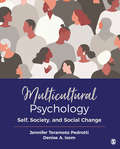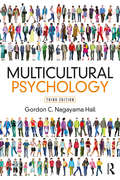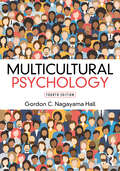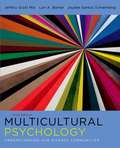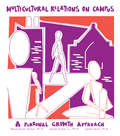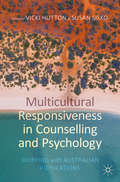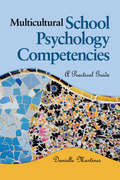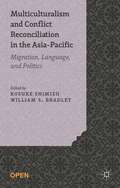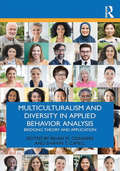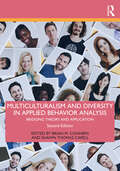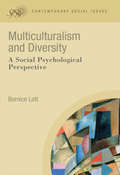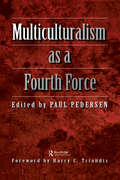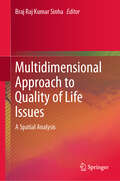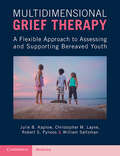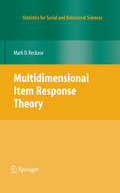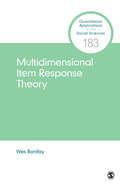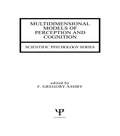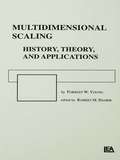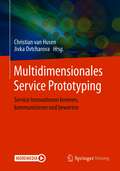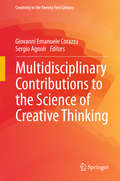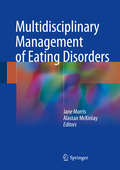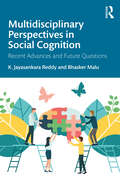- Table View
- List View
Multicultural Psychology: Self, Society, and Social Change
by Jennifer Teramoto Pedrotti Denise A. IsomCombining theory and history with an active approach rooted in self-reflection, Multicultural Psychology applies a framework of self-awareness and social justice to foundational and current topics across Multicultural Psychology studies today. Multicultural Psychology focuses on identity and its social context to help students view culture not just as a minority issue, but a way of understanding all human experiences. Multicultural Psychology will help students apply concepts to their own lives at point of learning, to assess their own awareness and progress, and to consider their own role and ability to engage in social change. With this balanced approach, Multicultural Psychology helps students entering the course with varied levels of cultural and diversity awareness to understand their individual and social cultural contexts, to gain awareness of their interactions with others, and to understand the intersections that occur with other cultures across their lives and careers.
Multicultural Psychology: Self, Society, and Social Change
by Jennifer Teramoto Pedrotti Denise A. IsomCombining theory and history with an active approach rooted in self-reflection, Multicultural Psychology applies a framework of self-awareness and social justice to foundational and current topics across Multicultural Psychology studies today. Multicultural Psychology focuses on identity and its social context to help students view culture not just as a minority issue, but a way of understanding all human experiences. Multicultural Psychology will help students apply concepts to their own lives at point of learning, to assess their own awareness and progress, and to consider their own role and ability to engage in social change. With this balanced approach, Multicultural Psychology helps students entering the course with varied levels of cultural and diversity awareness to understand their individual and social cultural contexts, to gain awareness of their interactions with others, and to understand the intersections that occur with other cultures across their lives and careers.
Multicultural Psychology: Third Edition
by Gordon C. Nagayama HallMulticultural Psychology introduces students to the myriad ways in which multicultural issues affect our understanding of, and research in, a wide range of domains including biological, developmental, social, and clinical psychological science. It provides in-depth coverage of the largest groups of color in the United States: African Americans, Latinx Americans, Asian Pacific Americans, and Native Americans. Students will gain an understanding of how race, ethnicity, and culture shape their own behavior, beliefs, interactions, and expectations, and those of the people around them. New to this edition: -New chapters on Clinical Psychology and Racial/Ethnic Identity and Acculturation -Greater focus on study of intersectional identities -Incorporates up-to-date research from a rapidly growing literature -Expanded coverage of qualitative research methods -Information about supplemental blog and video resources -Companion Website where students will find review questions and resource links, and instructors will find PowerPoint slides and discussion questions
Multicultural Psychology: Third Edition
by Gordon C. Nagayama HallThe new edition of this bestselling textbook, Multicultural Psychology, helps students gain an understanding of how race, ethnicity, and culture shape their beliefs and behavior as well as those of people around them. Giving a voice to people underrepresented in psychology and society, this book introduces multicultural research in biological, developmental, social, and clinical psychology. The book reviews histories, gender roles, and LGBTQ intersectionality of African Americans, Latinx Americans, Asian Americans/Native Hawaiians/Pacific Islanders, Native Americans, Americans of Middle Eastern and North African heritage, and Americans with Multiple Racial/Ethnic Heritages to provide in-depth coverage of the largest groups of color in the United States. It provides the perfect balance of careful presentation of psychological concepts, research, and theories, and a sensitive, expertly rendered discussion of their applications to people of color. This book is ideal for a course on Multicultural Psychology and a must read for all psychology students as well as for everyone interested in multiculturalism. It is accompanied by a full, updated set of resources for students and lecturers. Content new to this edition includes: A chapter on Emerging Groups covering Americans of Middle Eastern and North African heritage, and Americans with Multiple Racial/Ethnic Heritages Up-to-date research on a rapidly growing multicultural literature Review of research on cultural responses to COVID-19 Coverage of White privilege and Whiteness Expanded coverage of qualitative research methods Recent neuroscience research on personally relevant interventions Expanded coverage of LGBTQ intersectionality A glossary Updated instructor and student resources, including PowerPoint lecture slides, video resources, and classroom exercises and activities
Multicultural Psychology: Understanding Our Diverse Communities (Third Edition)
by Jeffery Scott Mio Lori A. Barker Jaydee Santos TumambingMulticultural Psychology: Understanding Our Diverse Communities, Third Edition, combines quantitative and qualitative research with anecdotal material to examine an array of multicultural issues and capture the richness of diverse cultures. The text focuses on such compelling topics as differences in worldviews, communication, racial and cultural identity development, racism, and immigration. Other issues covered in the text include gender, sexuality, age, and ability. The authors provide a strong, vivid, and personal voice to the text, richly populating it with anecdotes from themselves, their students, and other contributors, and using them as central points around which to build their case for multicultural issues based on science.
Multicultural Relations On Campus: A Personal Growth Approach
by James Scott Woodrow M. Parker James Archer Jr.First published in 1992. Routledge is an imprint of Taylor & Francis, an informa company.
Multicultural Responsiveness in Counselling and Psychology: Working with Australian Populations
by Vicki Hutton Susan SiskoThis textbook explores cultural responsiveness needed for working with diverse Australian communities in psychology and counselling settings, as well as in social science research. Key concepts essential for self-awareness and multicultural understanding are discussed in detail, encouraging readers to explore socialisation, discrimination and bias as well as effective principles for change. Topics covered include postcolonialism in relation to Indigenous Australians, racism, classism, sexism, cisgenderism and heterosexism, ageism, ableism, sizeism and religion. Over eleven chapters key concepts are discussed by experts in the field. Each topic covered includes a summary of relevant current affairs, followed by reflective essays from individuals sharing their own stories about their identities and experiences. Each chapter concludes with transformational learning activities to cultivate further insight, engagement and understanding of oppression and multicultural experiences.This book will be a core resource for those completing tertiary psychology and counselling courses in Australia, and for those wishing to ensure their existing practice is up to date.
Multicultural School Psychology Competencies: A Practical Guide
by Dr Danielle L. MartinesThis unique guidebook is specifically designed with useful multicultural applications aimed at practice-based school psychology. The text compiles an informational and instructional array of helpful "hands-on" checklists, reviews of some of the most current cultural literature applicable to best practices, and provides guided steps to take in various practice-based situations. Multicultural School Psychology Competencies: A Practical Guide is practice-based, culture-sensitive, and intended for the multicultural competency preparation of psychologists-in-training and in practice as well as other professionals working with diverse children and youth in schools and other educational settings.
Multiculturalism and Conflict Reconciliation in the Asia-Pacific: Migration, Language And Politics
by Kosuke Shimizu William S. BradleyMulticulturalism and Conflict Reconciliation in the Asia-Pacific: Migration, Language and Politics
Multiculturalism and Diversity in Applied Behavior Analysis: Bridging Theory and Application
by Brian M. Conners Shawn T. CapellThis textbook provides a theoretical and clinical framework for addressing multiculturalism and diversity in the field of applied behavior analysis (ABA). Featuring contributions from national experts, practicing clinicians, researchers, and academics that balance both a scholarly yet practical perspective, this book guides the reader through theoretical foundations to clinical applications to help behavior analysts understand the impact of diversity in the ABA service delivery model. Chapters contain learning objectives, literature reviews, practice considerations, case studies, and discussion questions and are all aligned with the current BACB® Professional and Ethical Compliance Code and BACB® Task List. Accompanying the book are online test materials for students and instructors to assess the knowledge they have learned about various diversity topics. This book is a must have for graduate students in ABA programs, faculty to incorporate diversity topics into graduate preparation, supervisors looking to enhance a supervisee’s understanding of working with diverse clients, and practicing behavior analysts in the field wanting to increase their awareness of working with diverse populations.
Multiculturalism and Diversity in Applied Behavior Analysis: Bridging Theory and Application
by Brian M. Conners and Shawn Thomas CapellThis textbook provides a theoretical and clinical framework for addressing multiculturalism and diversity in the field of applied behavior analysis (ABA).Featuring contributions from national experts, practicing clinicians, researchers, and academics which balance both a scholarly and practical perspective, this book guides the reader through theoretical foundations to clinical applications to help behavior analysts understand the impact of diversity in the ABA service delivery model. This fully updated second edition includes updates applicable to the new BACB® Ethics Code for Behavior Analysts. Chapters contain case studies, practice considerations, and discussion questions to aid further learning. Accompanying the book is an online test bank for students and instructors to assess the knowledge they have learned about various diversity topics.This book is essential for graduate students and faculty in ABA programs, supervisors looking to enhance a supervisee’s understanding of working with diverse clients, and practicing behavior analysts in the field wanting to increase their awareness of working with diverse populations.
Multiculturalism and Diversity: A Social Psychological Perspective (Contemporary Social Issues #3)
by Bernice LottMulticulturalism and Diversity focuses on the ways in which history and identity inform each other, and examines the politics of culture as well as the politics of cultural identities within the U.S. Illustrates the basic proposition that each of us is a unique multicultural human being and that culture affects individual self-definition, experience, behavior, and social interaction Moves from early simple definitions of multiculturalism to more complex understandings focused on culture as learned, teachable (shared), and fluid Uses a critical approach to the study of culture and personal identity that is informed by historical and social factors and an appreciation of their interaction Examines the various cultural threads within the mosaic of a person’s multicultural self such as sexual identity, gender, social class, and ethnicity
Multiculturalism as a fourth force
by Paul PedersenFirst published in 1999. Routledge is an imprint of Taylor & Francis, an informa company.
Multidimensional Approach to Quality of Life Issues: A Spatial Analysis
by Braj Raj Kumar SinhaThis comprehensive volume provides a broad overview of quality of life issues covering a wide geographical region: North America, Europe, parts of Africa, East Asia, and South Asia. Spread over more than 25 chapters, it includes the latest findings from these regions to provide a multidisciplinary account of the major dimensions of quality of life, and therefore has a vast scope. The volume is divided into four thematic parts: theoretical dimension; Demographic dimension; socio-cultural and economic dimensions; and urban and environment related dimensions. Extensive maps, diagrams and tables accompany the discussions and facilitate understanding. This is an indispensable reference and serves the interest of students and scholars of human geography, economics, demography, sociology, anthropology, social work, and philosophy. It is particularly useful for those engaged in further research on quality of life issues.
Multidimensional Functional Assessment of Older Adults: The Duke Older Americans Resources and Services Procedures
by Gerda G. FillenbaumReliable, easily administered, and objective ways of assessing the well-being of the elderly and their use of, and need for, services are rare. The author of this study provides current information on the Multidimensional Functional Assessment of Older Adults (MFAQ) -- the most widely used questionnaire of its type. This volume discusses ways in which the procedure has been used and can be used by clinicians, program evaluators and planners. The book also examines OARS (Older Americans Resources and Services Program) MFAQ and how it permits assessment of the level of functioning in five areas: social, economic, mental health, physical health and self-care. Readers will find detailed and updated information on administration, hand and computer-based scoring, as well as use of the questionnaire.
Multidimensional Grief Therapy: A Flexible Approach to Assessing and Supporting Bereaved Youth
by William Saltzman Christopher M. Layne Julie B. Kaplow Robert S. PynoosMultidimensional Grief Therapy (MGT) provides counselors, social workers, psychologists, and psychiatrists (as well as students in these fields) with a flexible program for assessing and supporting children and adolescents who have experienced bereavement. MGT is a strength-based intervention, designed to reduce unhelpful grief reactions that prevent adjustment, and promote adaptive grief reactions that enable children to cope better after a death. It also reduces associated symptoms of psychological distress and helps bereaved children and adolescents lead healthy, happy, productive lives. As young people grieve in different ways and “one-size-fits-all” treatments often lack effectiveness, MGT uses an assessment-driven, two-phased approach to effectively address the unique mental health needs of diverse youth. This manual provides a wealth of activities and handouts designed specifically to engage and empower youth after experiencing a death, including under traumatic circumstances.
Multidimensional Item Response Theory
by M. D. ReckaseFirst thorough treatment of multidimensional item response theory Description of methods is supported by numerous practical examples Describes procedures for multidimensional computerized adaptive testing
Multidimensional Item Response Theory (Quantitative Applications in the Social Sciences #183)
by Wes BonifaySeveral decades of psychometric research have led to the development of sophisticated models for multidimensional test data, and in recent years, multidimensional item response theory (MIRT) has become a burgeoning topic in psychological and educational measurement. Considered a cutting-edge statistical technique, the methodology underlying MIRT can be complex, and therefore doesn’t receive much attention in introductory IRT courses. However author Wes Bonifay shows how MIRT can be understood and applied by anyone with a firm grounding in unidimensional IRT modeling. His volume includes practical examples and illustrations, along with numerous figures and diagrams. Multidimensional Item Response Theory includes snippets of R code interspersed throughout the text (with the complete R code included on an accompanying website) to guide readers in exploring MIRT models, estimating the model parameters, generating plots, and implementing the various procedures and applications discussed throughout the book.
Multidimensional Item Response Theory (Quantitative Applications in the Social Sciences #183)
by Wes BonifaySeveral decades of psychometric research have led to the development of sophisticated models for multidimensional test data, and in recent years, multidimensional item response theory (MIRT) has become a burgeoning topic in psychological and educational measurement. Considered a cutting-edge statistical technique, the methodology underlying MIRT can be complex, and therefore doesn’t receive much attention in introductory IRT courses. However author Wes Bonifay shows how MIRT can be understood and applied by anyone with a firm grounding in unidimensional IRT modeling. His volume includes practical examples and illustrations, along with numerous figures and diagrams. Multidimensional Item Response Theory includes snippets of R code interspersed throughout the text (with the complete R code included on an accompanying website) to guide readers in exploring MIRT models, estimating the model parameters, generating plots, and implementing the various procedures and applications discussed throughout the book.
Multidimensional Models of Perception and Cognition (Scientific Psychology Series)
by F. Gregory AshbyThe mental representations of perceptual and cognitive stimuli vary on many dimensions. In addition, because of quantal fluctuations in the stimulus, spontaneous neural activity, and fluctuations in arousal and attentiveness, mental events are characterized by an inherent variability. During the last several years, a number of models and theories have been developed that explicitly assume the appropriate mental representation is both multidimensional and probabilistic. This new approach has the potential to revolutionize the study of perception and cognition in the same way that signal detection theory revolutionized the study of psychophysics. This unique volume is the first to critically survey this important new area of research.
Multidimensional Scaling: History, Theory, and Applications
by Forrest W. YoungThis outstanding presentation of the fundamentals of multidimensional scaling illustrates the applicability of MDS to a wide variety of disciplines. The first two sections provide ground work in the history and theory of MDS. The final section applies MDS techniques to such diverse fields as physics, marketing, and political science.
Multidimensionales Service Prototyping: Service Innovationen kreieren, kommunizieren und bewerten
by Christian Van Husen Jivka OvtcharovaDas Buch stellt einen neuen Ansatz für Innovationsprozesse von Dienstleistungen vor, ein „Multidimensionales Service Prototyping“. Innovation von Dienstleistungen wird durch den Einsatz von Service Prototypen agiler und kundenorientierter. Methoden und die Umsetzung des Prototyping werden dargestellt und erläutert. In Anwendungsbeispielen werden die Entwicklung technischer Dienstleistungen von Online-Beratungsautomaten bis zu Simulatoren für die Ausbildung von Maschinenbedienern präsentiert.Prototypen sind in der Fahrzeugtechnik und im Werkzeugbau ein üblicher Entwicklungsschritt auf dem Weg zum marktreifen Produkt. Für Dienstleistungen hingegen gibt es noch kein verbindliches und wissenschaftlich erprobtes System zur Entwicklung von Prototypen. Gleichzeitig gewinnt das Angebot von Produkt-Service-Systemen als Kombination aus technischen Gütern und Dienstleistungen stark an Bedeutung. Unternehmen müssen zunehmend komplexe Dienstleistungen neu entwickeln – verbunden mit der Herausforderung, bereits im Entwicklungsprozess über Servicekonzepte zu entscheiden, diese mit den Beteiligten zu kommunizieren und zu testen. Dafür können Service Prototypen entscheidende Beiträge leisten.Videos per App: Laden Sie die Springer Nature More Media App kostenlos herunter - Abbildungen im Buch per App mit Handy oder Tablet scannen, um Videos zu streamen.
Multidisciplinary Contributions to the Science of Creative Thinking
by Giovanni Emanuele Corazza Sergio AgnoliThis book offers a multidisciplinary and multi-domain approach to the most recent research results in the field of creative thinking and creativity, authored by renowned international experts. By presenting contributions from different scientific and artistic domains, the book offers a comprehensive description of the state of the art on creativity research. Specifically, the chapters are organized into four parts: 1) Theoretical Aspects of Creativity; 2) Social Aspects of Creativity; 3) Creativity in Design and Engineering; 4) Creativity in Art and Science. In this way, the book becomes a necessary platform for generative dialogue between disciplines that are typically divided by separating walls.
Multidisciplinary Management of Eating Disorders
by Jane Morris Alastair McKinlayThis Handbook is an indispensable guide for the multidisciplinary management of eating disorders. It discusses a broad range of issues: managing high-risk patients, the challenges of inserting feeding tubes, addressing nutritional aspects and dealing with additional disorders which might complicate matters, such as diabetes, coeliac disease and cystic fibrosis. It discusses fertility, pregnancy, and eating disorders in children and adolescents, as well as addressing the needs of families. Chapters contain key checklists and flow diagrams. Abundant pictures and conversations, coloured diagrams, charts, maps and boxes, support readers’ varying learning styles and assist retention of key points. Vignettes taken from real (but strenuously anonymised) cases appeal to clinicians’ preference for case-based learning. The book also functions as a practical manual of ‘What to do – and what NOT to do’ with practical scenarios. In the acute situation, clinicians will be able to go directly to the relevant chapter to guide the team through the ‘when, where, how, why and with whom’ of assessing and managing patients with eating disorders. The book is primarily aimed at postgraduate physicians managing patients with Eating disorders on Gastrointestinal, Endocrine or general medical wards, and those who seek to deepen their expertise as they sit higher professional examinations. It is of interest to both medical and psychiatric clinicians, as well as useful to nursing and multidisciplinary staff who want to develop a compassionate understanding of the true pain driving their patients’ behaviours.
Multidisciplinary Perspectives in Social Cognition: Recent Advances and Future Questions
by K. Jayasankara Reddy Bhasker MaluThis book introduces social cognition from multidisciplinary perspectives, exploring in detail how individuals perceive, interpret, and respond to social stimuli throughout different stages of life.The book is organized into five parts, and each chapter provides a concise introduction to a specific topic within social cognition, followed by an in-depth exploration of prominent areas of research, the impact of technology, and potential future questions. The book covers core principles of social cognition alongside application in clinical interventions, with topics including how social cognition evolves throughout the lifespan, the impact of technology and social media on social cognition, and how conditions like autism, schizophrenia, and dementia affect social processing. It links social cognition with critical cognitive domains, including attention, memory, and decision-making, highlighting how these processes interact in shaping social behaviour. The book also combines cross-cultural research with relevant studies to show the differences and similarities in social cognition across geographical distances. Each part concludes with guided questions and answers for students to test their understanding knowledge and learning outcomes. By synthesizing current research and identifying future directions, this book offers valuable insights and potential solutions to the complex challenges in the field of social cognition.Bringing together foundational concepts with advances in the field, the book is ideal reading for students of social psychology, cognitive psychology, social neuroscience, and neuropsychology. It will also be of interest to students and researchers of clinical psychology, providing a foundation for future research in applied settings.
